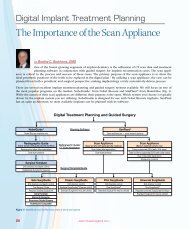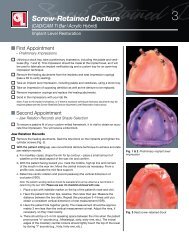PDF Download - Glidewell Dental Labs
PDF Download - Glidewell Dental Labs
PDF Download - Glidewell Dental Labs
Create successful ePaper yourself
Turn your PDF publications into a flip-book with our unique Google optimized e-Paper software.
markets have been highly penetrated,<br />
such as Korea and Japan. Statistically<br />
speaking, per 10,000 people, they have<br />
more people who need and are getting<br />
implants. So why are we behind? Part<br />
of it is the general dentist population,<br />
who patients go to and trust —<br />
DC: The quarterback.<br />
DT: More like the gatekeeper. The guy<br />
you trust, who does not feel comfortable<br />
doing an implant, so he does a<br />
bridge. And the patient doesn’t question<br />
it, unless the patient is well educated<br />
and realizes there is another<br />
possible route. Today, the Internet is<br />
helping. I’ve said this to my own academy<br />
in periodontology: “Don’t hesitate<br />
to train the general dentist now.”<br />
They’ve been fighting general dentists,<br />
and I’m on record now saying this, as<br />
a teacher: “If people want to learn<br />
something, they’re going to learn it.”<br />
When I at first was not allowed to take<br />
the course that Brånemark gave, I had<br />
to take it as a prosthodontist, not as<br />
a periodontist. But we periodontists<br />
had a will. This was something that<br />
we wanted, and we found a way to<br />
learn. The general dentist who wants<br />
to learn is going to do the same thing.<br />
So why don’t we be the ones to teach<br />
them in a way that is accepted, so they<br />
can decide whether they want to do<br />
implants? They’ll still come to us for<br />
referrals in the more difficult cases,<br />
and even in some regular cases — and<br />
for their mother and their father. What<br />
I’m saying is, if we had penetrated the<br />
market by 50, 60, 70 percent, everybody<br />
would be looking at each other’s<br />
cases, and stealing each other’s cases.<br />
But here’s the key: Because we’ve<br />
only penetrated the market by about 8<br />
percent, there’s such room for expansion,<br />
for the whole pie to grow. And<br />
that’s when everybody will be happy,<br />
including the general dentists who<br />
may want to do something different,<br />
as well as the periodontists, the oral<br />
surgeons and the prosthodontists. The<br />
market will expand for everybody.<br />
The key is to get the word out to the<br />
general dentist and to the patient that<br />
Because we’ve only penetrated the market<br />
by about 8 percent, there’s such room for<br />
expansion … And that’s when everybody<br />
will be happy, including the general<br />
dentists who may want to do something<br />
different, as well as the periodontists, the<br />
oral surgeons and the prosthodontists.<br />
implants are safe and reliable when<br />
done properly. The periodontists,<br />
prosthodontists and oral surgeons can<br />
all do their part, and everybody should<br />
be happy because the pie will grow.<br />
DC: We’ve seen that the metric you mentioned<br />
— the number of implants placed<br />
per 10,000 inhabitants — is pretty common<br />
within the industry. One thing<br />
we’ve noticed is that those countries<br />
with the highest level of penetration are<br />
also the countries where the cost is the<br />
lowest — not only the treatment cost to<br />
the patient, but also the cost of the components,<br />
the materials, the implants. Do<br />
you think there is a direct correlation,<br />
or is this a coincidence?<br />
DT: Well, I think it may be part<br />
coincidence, due to some of these<br />
countries tending to be more<br />
nationalistic from a business standpoint.<br />
Whereas the big companies had market<br />
share in many parts of the world —<br />
often total market share — some places<br />
like Korea, to give an example, began<br />
to develop their own industry, and<br />
they began making their own implants.<br />
So there were Korean companies<br />
making their own implants, and they<br />
were moderately priced — not even<br />
inexpensively priced. Some people in<br />
these countries said, “OK, the quality is<br />
there, I’m Korean, and I prefer to buy a<br />
Korean implant.” So the big companies<br />
lost some of their market share there.<br />
The same thing is happening in Brazil.<br />
Part of that is because it’s inexpensive,<br />
but part of that is a feeling of national<br />
pride in being able to place a Korean or<br />
a Brazilian implant, for example. If you<br />
look at the implant marketplace around<br />
the world, let’s say in Germany — which<br />
is a big implant market, as you know<br />
— one of the German-made implants<br />
is always one of the biggest sellers,<br />
certainly one of the top two or three.<br />
In Switzerland, it’s Swiss implants. In<br />
Sweden, the Swedish implant is number<br />
one. So there’s a bit of a nationalistic<br />
flavor to the implant world.<br />
DC: It’s the World Cup of dental implants.<br />
DT: That’s about right. In the U.S. for<br />
a while, it was that way, too. We were<br />
certainly strong contenders. Americanmade<br />
implants just felt comfortable.<br />
That’s what I think was going on. Of<br />
course the economy today is so difficult,<br />
certainly in Europe. There are<br />
ups and downs in Asia. And in America<br />
now, we are just slowly starting to<br />
come out of the recession. But we’re<br />
getting there. I certainly see that in<br />
my practice. Three years ago, when<br />
we were all about to go over the cliff,<br />
almost literally, people just stopped<br />
spending. You couldn’t tell patients<br />
they needed a full-mouth rehabilitation.<br />
The words just wouldn’t come<br />
out of your mouth. The question was<br />
more, “What do I need now to hold<br />
me off?” They weren’t ready to spend.<br />
– Implant Q&A: An Interview with Dr. Dennis Tarnow – 13

















